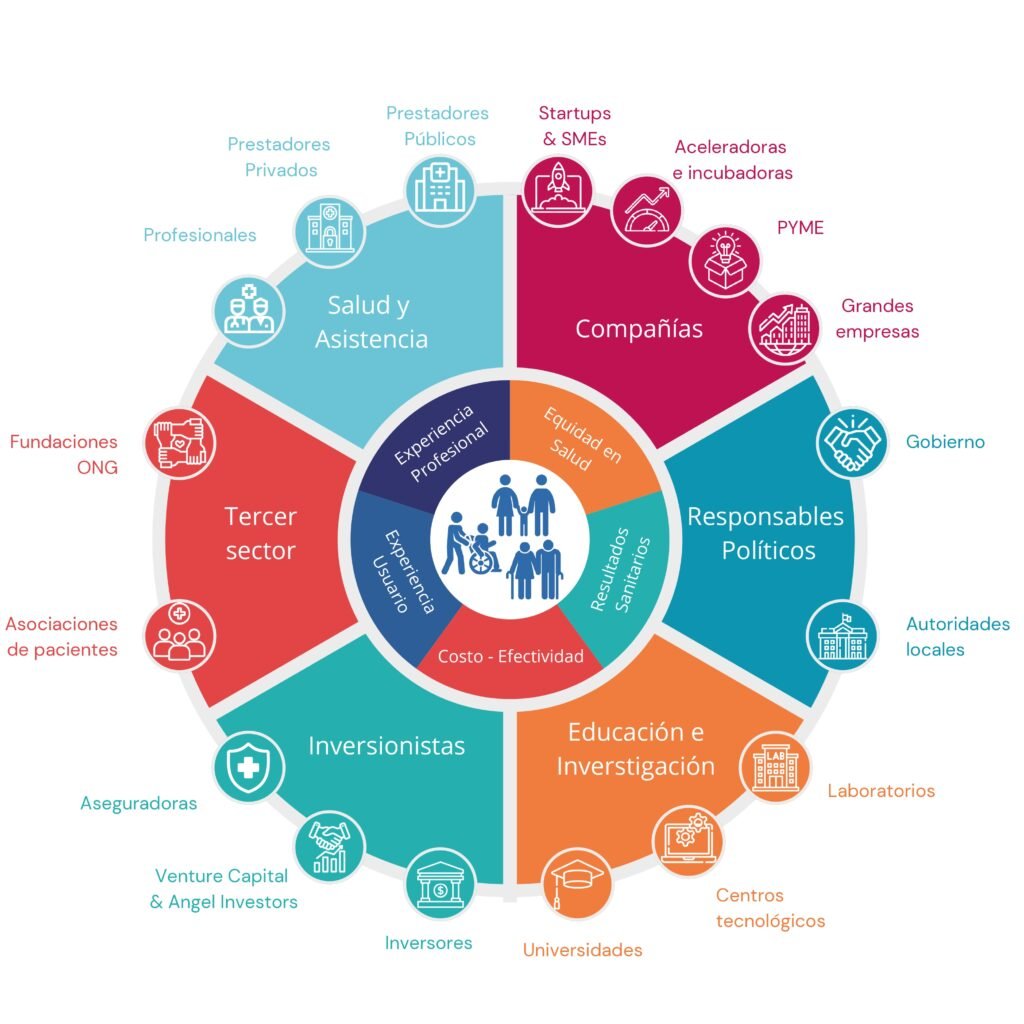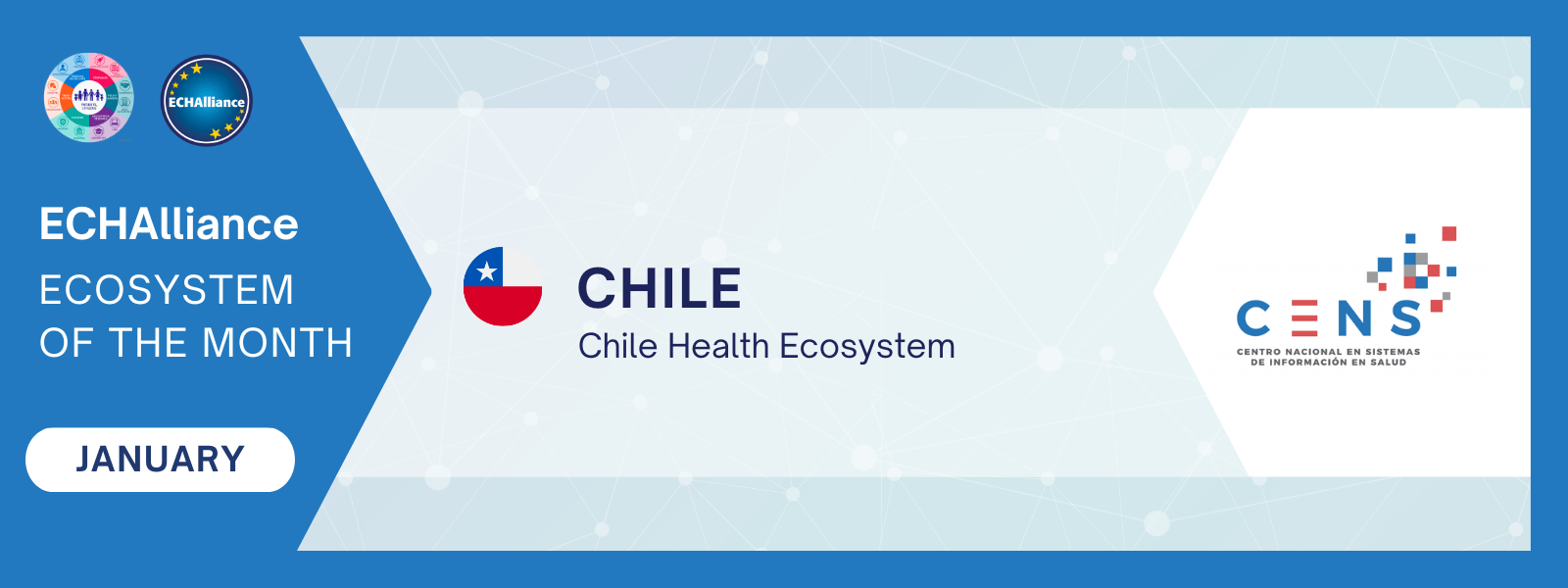What is the approximate stakeholder breakdown of your ecosystem?
The Chilean healthcare system faces challenges of limited resources and a sustained increase in demand, which is reflected in long waiting times. Many patients transit between different healthcare providers and face the need for actors to share clinical information effectively and efficiently. Profound changes are required at different levels to meet the challenges of health information interoperability. The promotion of innovation in the sector has the potential to generate effective, cost-efficient and scalable solutions. Although Chile is a leader in innovation in Latin America and the Caribbean and has instances of support for innovation, its penetration in the health sector is low (13%), being limited by the lack of interaction and collaboration between the different actors.
In this context, the construction and consolidation of our innovation ecosystem in digital health aims to establish a cultural framework, facilitating participation and collaboration, aligning interests, incentives and benefits for all stakeholders identified around the fivefold goal, always with a focus on users. At the same time, it favours the development of lasting links based on trust, promoting intra- and inter-sectoral collaboration to achieve self-sustainability and participatory self-management. Our ecosystems’ stakeholders model identified to date is shown below:

Who are the top 3 champions from your Ecosystem?
We have several actors that strongly drive the ecosystem, mainly: patient associations, health care providers, industry and the Ministry of Health.
The collaborative work with patients’ associations has focused on drafting a manifesto on rights from the user perspective in the era of digital health, through various participatory activities for subsequent dissemination through various mechanisms, including a seminar open to society. In relation to the industry, especially our members (https://cens.cl/membresia-cens/), we are working together to promote innovation, development of best practices in quality issues in health information systems and interoperability, and also to promote the development of advanced human capital in the digital health ecosystem.
The Ministry of Health is driving a digital health strategy and a change in health reform. So the efforts we are developing with the ecosystem that align with their strategy are being supported. Notably, the manifesto that we are creating with patient associations and the innovation program for healthcare providers.
What EU funding/collaboration are you involved with, or you would like to be part of?
We have not received direct funding yet, however, for the consolidation of the ecosystem we have worked collaboratively with Deep Ecosystems.
What are the key priorities and themes for your ecosystem?
The main issues for the development of the ecosystem is to consolidate a culture of innovation in health care providers, for which we will promote the installation of innovation capacity within the organization. The promotion of a culture and strategic guidelines for innovation in the organization will reduce resistance to change and will encourage collaboration with other actors to value the incorporation and adoption of new technologies in order to improve efficiency in the delivery of services to the users of the health system.
What is your primary strength as an ecosystem?
We are convinced that collaboration between ecosystem actors allows mutual benefits and risk sharing, contributing to close the gaps that exist in the delivery of health services in the health system in Chile.
Which are the main hospitals in your ecosystem and which are the most active in your ecosystems?
We are strongly promoting the installation of innovation capabilities in healthcare institutions, through an innovation program, in conjunction with Pro Salud Chile and CORFO and supported by the Chilean Ministry of Health. This program has three stages: 1) Training program to install capacities in health institutions, 2) Matchmaking between challenges of health institutions and solutions of companies/entrepreneurs/startups, and 3) Implementation of solutions in health institutions.
Stage 1
The training program consisted of two modules. In the first, “Innovation in health”, innovation capabilities have been installed in health institutions. In this module, 92 participants and 27 health institutions (80% public institutions, 20% private) participated, of which only 10 met the requirements and advanced to module 2, “Innovation Methodology”. The second module is an adaptation of the design thinking methodology already described. In it, the open innovation challenges that each health care institution wants to work on have been identified. At this stage, it is important to design a brief technical sheet describing the challenge to be solved.
Stage 2
This stage has aimed to connect the challenge(s) posed by the healthcare institutions, with possible existing solutions in the digital health ecosystem. For this, it has been crucial to make a call for companies and startups that have solutions that solve the challenges. This call has included: the development of a technical sheet of the challenge to be solved, the competition rules that are the frame of reference for the applicants (requirements that companies must meet to carry out the pilot, as well as an institutional commitment to carry it out), and the dates of the most relevant milestones. This stage has been supported by the Corporación de Fomento de la Producción (Conecta Corfo).
The training program consisted of two modules. In the first, “Innovation in health”, innovation capabilities have been installed in health institutions. In this module, 92 participants and 27 health institutions (80% public institutions, 20% private) participated, of which only 10 met the requirements and advanced to module 2, “Innovation Methodology”. The second module is an adaptation of the design thinking methodology already described. In it, the open innovation challenges that each health care institution wants to work on have been identified. At this stage, it is important to design a brief technical sheet describing the challenge to be solved.
Stage 2
This stage has aimed to connect the challenge(s) posed by the healthcare institutions, with possible existing solutions in the digital health ecosystem. For this, it has been crucial to make a call for companies and startups that have solutions that solve the challenges. This call has included: the development of a technical sheet of the challenge to be solved, the competition rules that are the frame of reference for the applicants (requirements that companies must meet to carry out the pilot, as well as an institutional commitment to carry it out), and the dates of the most relevant milestones. This stage has been supported by the Corporación de Fomento de la Producción (Conecta Corfo).
Stage 3
To begin with the implementation of the solutions in the institution, we recommend an “internal launch” that addresses the journey that people have taken on the innovation journey. This “internal launch” should consider the challenge identified, a description of the pilot to be conducted and, most importantly, invite all key internal and external stakeholders to ensure institutional commitment to the successful development of the pilot
To begin with the implementation of the solutions in the institution, we recommend an “internal launch” that addresses the journey that people have taken on the innovation journey. This “internal launch” should consider the challenge identified, a description of the pilot to be conducted and, most importantly, invite all key internal and external stakeholders to ensure institutional commitment to the successful development of the pilot
Institutional launching of the solutions to be validated in:
A) Hospital San José de Melipilla
B) National Cancer Institute
C) Hospital Dr. Eloísa Díaz in La Florida
D) Hospital Adriana Cousiño in Quintero





